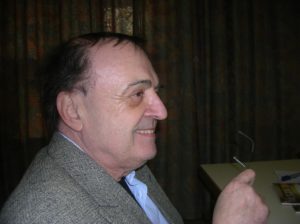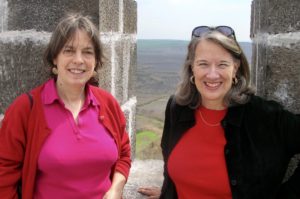PEN Journey 32: London Headquarters: Coming to Grips
PEN International celebrates its Centenary in 2021. I’ve been active in PEN for more than 30 years in various positions and now as an International Vice President Emeritus. With memories stirring and file drawers of documents and correspondence bulging, I am a bit of a walking archive and have been asked by PEN International to write down memories. I hope this personal PEN journey will be of interest.
PEN is a work in progress. It has always been a work in progress during its 100 years. Governing an organization with centers and members spread across the globe in over 100 countries can be like changing clothes, writing a novel and balancing a complex checkbook all while hang gliding. Perhaps an exaggeration, but not by much.
In 2004 the leadership of President and International Secretary were at the center of the governing structure along with the Treasurer and a relatively new Board. The President represented PEN in international forums. The International Secretary was tasked with overseeing the office and the centers of PEN and with any tasks the President handed over like running board meetings and setting up the agenda for work. The concept was that PEN should be able to elect as President a writer of international stature to represent PEN in global forums but not have the obligation to run the organization. That could be the role of the International Secretary, along with the Board and staff.
When I assumed the role of International Secretary, PEN did not yet have an executive director, though the consensus had built from the strategic planning process that we needed one. Both the President and International Secretary were volunteer, unpaid positions, which meant they were not full time. At the post-Congress board meeting after Tromsø, we agreed to begin a search for an executive director.
I suggested monthly board meetings, which had not been the practice. We could do these by phone, which meant there were only a few hours a day when everyone would be awake. If Judith Rodriguez in Melbourne, Australia could stay up past 11pm and Eric Lax in Los Angeles didn’t mind waking up at 7am, the rest of us—Takeaki Hori in Japan, Sibila Petlevski in Croatia, Eugene Schoulgin in Norway, Elisabeth Nordgren in Finland, Cecilia Balcazar in Colombia as well as President Jiří Gruša when he joined from Vienna or Prague and me in Washington, DC or London—could find our time zone and call in. The technology was not as sophisticated as today, and we didn’t yet use skype so the calls were not cheap, but we began to manage each month.

International PEN President Jiří Gruša
As International Secretary, I was in charge of overseeing the office and staff, working with centers on conferences and projects and along with Jiří, liaising with our partners like UNESCO. Administrative Director Jane Spender and I drew up the agenda for each board meeting. I always checked with Jiří to see if he had items to add and to see if he wanted to join the board meeting. I chaired most of the board meetings and much of the Assembly of Delegates at the Congresses. English was not Jiří’s first or second language, and he had other large obligations. During his presidency, he took on the Directorship of the Diplomatic Academy of Vienna, where we held our winter board meetings. This division of tasks between Jiří and me was quite different when the next President John Ralston Saul took on the presidency in 2009, along with Takeaki Hori as International Secretary. John was a much more hands-on President than Jiří. The President and International Secretary were a team and usually agreed between them who would do what.
One of my most important and enjoyable partnerships was with Administrative Director Jane Spender, who was promoted to Program Director for Jane had been instrumental in the thinking and execution of PEN International programs first years. I tried to spend at least a week to 10 days each month in London or on the road for PEN. I was able to finance my travel outside of PEN’s budget. Jane and I worked closely together as we outlined what yet needed to be done in PEN’s move to modernize systems. Each International Secretary had operated in a way that worked for the time. In my tribute to retiring international Secretary Terry Carlbom, I’d noted that early in PEN’s life, around 1924 at a meeting in Vienna, the French representative had turned to the German representative and said, “PEN means Paix Entre Nous (“Peace between us.”).* Members did not always agree with each other and would perhaps even get angry, but the hope was that members would honor and serve that acronym well.

L to R: International PEN Program Director Jane Spender and PEN International Secretary Joanne Leedom-Ackerman at the wall surrounding Diyarbakir, Turkey in March, 2005.
After Terry debriefed me at the PEN Congress in Tromsø, one of my first visits was to Paris to talk with former International Secretary Alexander Blokh, who had held the position for 17 years, to listen to his experience. The times and the demands were changing from Alex’s day as PEN grew and as the world sped up and shrank at the same time with the advent of the internet.
One of my early calls was to George Gawlinski, who had taken PEN through the strategic planning process in Bellagio in 2003 (see PEN Journey 28). George’s advice was that we hire an interim executive director while we did a search for an executive director. He said he happened to know that one of the best in that business was available, a man named Peter Firkin. He could come in, help us get systems in place like employment policies which we didn’t have, a budget which we didn’t have and help set up the systems the office would need to appeal to a first rate executive director and also begin relieving the impossible workload Jane and the staff bore. Jane and I interviewed Peter together. After about twenty minutes (or less), we exchanged relieved glances over the table and knew we had found who we needed for that moment.
A grey-haired New Zealander with wide experience with organizations and a love for books, Peter spoke with the Board and Jiří, and PEN hired him to come in several days a week to begin helping, including assisting in the search process. My notebook of lists had already grown quite full, and now these lists Jane and I allocated among the three of us. One of the big tasks was to develop an overall budget for the organization. The Writers in Prison Committee operated with a budget, but the rest of the organization operated project by project and at the end of the year, a list of expenses and income was recorded. There was not a budget projected forward for the whole organization, rather an accounting of money spent and money received. The only way to draw up PEN’s first budget was to look at what was spent the year before and project forward. The budgeting processes also needed to be set in place. American PEN sent over its financial director to work with the London office for a week with Jane and Peter and the Treasurer Britta Junge Pedersen and bookkeeper Kathy Barazetti. It took a while, but we eventually had a comprehensive, estimated budget for the whole organization.
Another task was to revise our status with the British Charity Commission, which oversaw all charities in Britain. The work of human rights organizations had been regarded as being political in nature, therefore not permitted charitable funds. Some organizations like International PEN had set up charitable trusts—the International PEN Foundation—to raise funds for their educational work. But with a change in the law, human rights organizations were now accepted as a-political. With Peter’s help we found a law firm that could take us through the process to dissolve the International PEN Foundation so International PEN could operate as one charitable organization.
We also found new and highly respected auditors. All these were the nuts and bolts on the continued journey to improve and modernize International PEN. During Terry Carlbom’s tenure as International Secretary, we had gotten rules and regulations and procedures updated and approved and the strategic planning process underway. The tasks and lists to get International PEN operating more efficiently seemed endless, but each day Jane and I checked more items off the lists.
We hired a highly recommended search firm, which Human Rights Watch had used successfully. Jane and Sara made it clear they did not want to be considered for the position of executive director. Jane was made the Program Director and Sara remained the Director of the Writers in Prison Committee. The board set up a committee to oversee the search, to read resumes given us, help set out the tasks and interview questions for finalists and ultimately to interview final candidates. The committee included Eric Lax, Eugene Schoulgin, myself, and Peter Firkin. We consulted closely with Jane and Sara who also interviewed the finalists.
All of this work related to the systems of the organization and were interesting and enjoyable because of the colleagues I was working with even with long hours and sandwiches for dinner at the office. But the most fun was the programs and going out into the world and working with writers. My first trip was to Dakar, Senegal, where one of our oldest African Centers had committed to host the 2007 PEN Congress and was bringing together all the African centers for a conference. One of PEN’s early Vice Presidents had been poet Leopold Senghor, who was also the first President of Senegal. A sentence I wrote and memorized before going there I remember to this day: Il n’a que qelques autre pays dans le monde ou l’ecrivain est plus honore qu’au Senegal. “There are few countries in the world where the writer is more honored than in Senegal.”
In December I left for Jamaica with Canadian PEN’s executive director Isobel Harry. Writers in Jamaica, along with UNESCO’s representative there, wanted to start a PEN Center for the Caribbean.
*P.E.N. acronym stands for Poets Essayists and Novelists; along the way it expanded to Poets Essayist/Editors and Novelists
Next Installment: PEN Journey 33: Senegal and Jamaica: PEN’s Reach to Old and New Centers